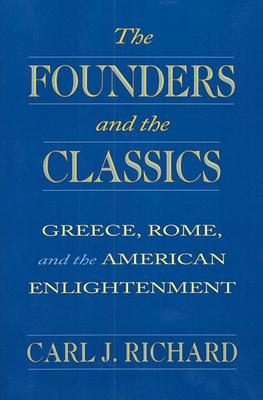Is our Greek and Roman heritage merely allusive and illusory? Or were our founders, and so our republican beginnings, truly steeped in the stuff of antiquity? So far largely a matter of generalization and speculation, the influence of Greek and Roman authors on our American forefathers finally becomes clear in this fascinating book-the first comprehensive study of the founders' classical reading.
Carl J. Richard begins by examining how eighteenth-century social institutions in general and the educational system in particular conditioned the founders to venerate the classics. He then explores the founders' various uses of classical symbolism, models, "antimodels," mixed government theory, pastoralism, and philosophy, revealing in detail the formative influence exerted by the classics, both directly and through the mediation of Whig and American perspectives. In this analysis, we see how the classics not only supplied the principal basis for the U.S. Constitution but also contributed to the founders' conception of human nature, their understanding of virtue, and their sense of identity and purpose within a grand universal scheme. At the same time, we learn how the classics inspired obsessive fear of conspiracies against liberty, which poisoned relations between Federalists and Republicans. The shrewd ancients who molded Western civilization still have much to teach us, Richard suggests. His account of the critical role they played in shaping our nation and our lives provides a valuable lesson in the transcendent power of the classics.
Book
The Founders and the Classics: Greece, Rome, and the American Enlightenment
(Write a Review)
Paperback
$39.44
Is our Greek and Roman heritage merely allusive and illusory? Or were our founders, and so our republican beginnings, truly steeped in the stuff of antiquity? So far largely a matter of generalization and speculation, the influence of Greek and Roman authors on our American forefathers finally becomes clear in this fascinating book-the first comprehensive study of the founders' classical reading.
Carl J. Richard begins by examining how eighteenth-century social institutions in general and the educational system in particular conditioned the founders to venerate the classics. He then explores the founders' various uses of classical symbolism, models, "antimodels," mixed government theory, pastoralism, and philosophy, revealing in detail the formative influence exerted by the classics, both directly and through the mediation of Whig and American perspectives. In this analysis, we see how the classics not only supplied the principal basis for the U.S. Constitution but also contributed to the founders' conception of human nature, their understanding of virtue, and their sense of identity and purpose within a grand universal scheme. At the same time, we learn how the classics inspired obsessive fear of conspiracies against liberty, which poisoned relations between Federalists and Republicans. The shrewd ancients who molded Western civilization still have much to teach us, Richard suggests. His account of the critical role they played in shaping our nation and our lives provides a valuable lesson in the transcendent power of the classics.Paperback
$39.44